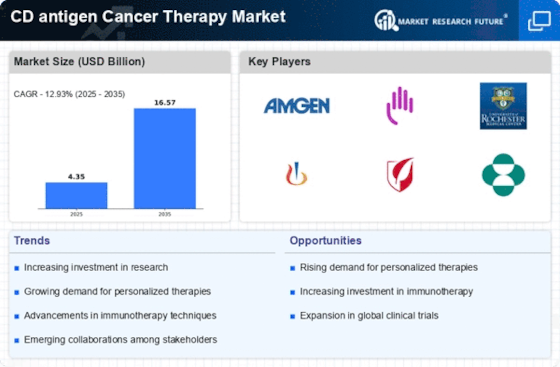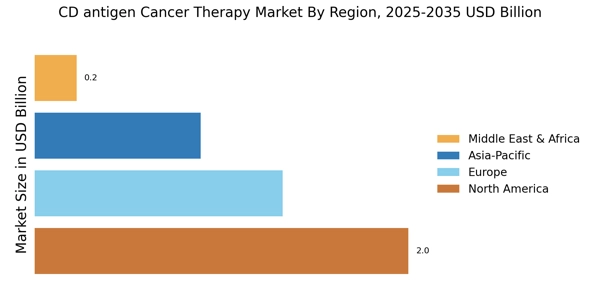Increasing Prevalence of Cancer
The rising incidence of cancer worldwide is a primary driver for the CD antigen Cancer Therapy Market. According to recent statistics, cancer cases are projected to increase significantly, with estimates suggesting that by 2040, the number of new cancer cases could reach over 27 million annually. This alarming trend necessitates the development of innovative therapies, including those targeting CD antigens. As healthcare systems strive to address this growing burden, investments in research and development for CD antigen therapies are likely to surge, thereby propelling market growth. Furthermore, the increasing awareness of cancer screening and early detection is expected to contribute to the demand for effective treatment options, including CD antigen therapies, which may offer more targeted and personalized approaches to cancer care.
Rising Demand for Targeted Therapies
The increasing demand for targeted therapies is reshaping the CD antigen Cancer Therapy Market. Patients and healthcare providers are increasingly favoring treatments that offer specificity and reduced side effects compared to traditional chemotherapy. CD antigen therapies, which focus on specific markers present on cancer cells, align well with this trend. Market analysis suggests that the targeted therapy segment is expected to grow at a compound annual growth rate (CAGR) of over 10% in the next five years. This shift towards precision medicine is likely to drive the development and adoption of CD antigen therapies, as they promise to enhance treatment outcomes and improve patient quality of life. Consequently, pharmaceutical companies are investing heavily in research and development to bring innovative CD antigen therapies to market.
Growing Investment in Cancer Research
The surge in funding for cancer research is a crucial driver for the CD antigen Cancer Therapy Market. Governments and private organizations are increasingly allocating resources to combat cancer, recognizing its impact on public health. For instance, the National Cancer Institute has reported a significant increase in its budget, which is expected to exceed USD 6 billion in the coming years. This influx of funding is likely to accelerate the development of CD antigen therapies, as researchers explore novel approaches to harness the immune system's potential against cancer. Additionally, partnerships between academic institutions and biotechnology firms are becoming more common, further enhancing the research landscape. As a result, the CD antigen Cancer Therapy Market is poised for growth, driven by the collaborative efforts to innovate and improve cancer treatment options.
Regulatory Support for Innovative Therapies
Regulatory bodies are increasingly supportive of innovative cancer therapies, which serves as a significant driver for the CD antigen Cancer Therapy Market. Initiatives aimed at expediting the approval process for breakthrough therapies are becoming more prevalent. For example, the FDA's Breakthrough Therapy Designation allows for faster development and review of drugs that show promise in treating serious conditions. This regulatory environment encourages pharmaceutical companies to invest in the development of CD antigen therapies, as they can potentially reach the market more quickly. Furthermore, the emphasis on patient-centric approaches in regulatory frameworks is likely to enhance the focus on therapies that target specific cancer antigens. As a result, the CD antigen Cancer Therapy Market is expected to benefit from this supportive regulatory landscape, fostering innovation and improving patient access to new treatment options.
Technological Advancements in Cancer Treatment
Technological innovations in cancer treatment are significantly influencing the CD antigen Cancer Therapy Market. The advent of advanced techniques such as CRISPR gene editing and next-generation sequencing has revolutionized the way cancer therapies are developed and administered. These technologies enable researchers to identify specific CD antigens associated with various cancer types, facilitating the creation of more effective and personalized therapies. Market data indicates that The CD antigen Cancer Therapy Market is expected to reach approximately USD 200 billion by 2025, with a substantial portion attributed to novel therapies targeting CD antigens. As these technologies continue to evolve, they are likely to enhance the efficacy of CD antigen therapies, thereby attracting more investment and interest from pharmaceutical companies and research institutions.


















